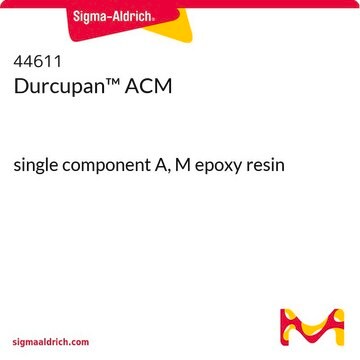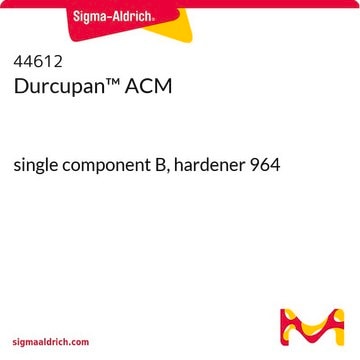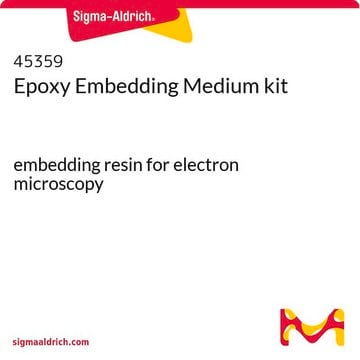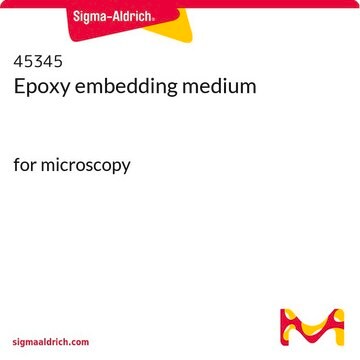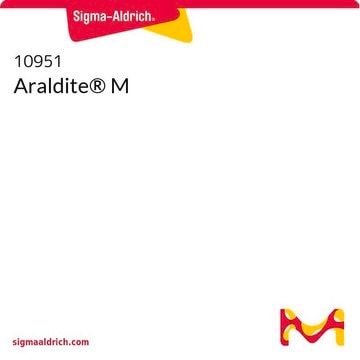Recommended Products
Quality Level
Looking for similar products? Visit Product Comparison Guide
Application
- A method to prepare large resin sections for counting myelinated axons in rodent CNS and PNS structures.: This study presents a technique using Durcupan ACM for preparing large resin sections, enhancing the analysis of myelinated axons in rodent central and peripheral nervous systems (Dzurjašková et al., 2021) (Dzurjašková et al., 2021).
- Three-dimensional immersive virtual reality for studying cellular compartments in 3D models from EM preparations of neural tissues.: This research utilizes Durcupan ACM in electron microscopy to create 3D models of neural tissues, facilitating studies via immersive virtual reality (Calì et al., 2016) (Calì et al., 2016).
- Long-term effect of prazosin and losartan administration on blood pressure, heart, carotid artery, and acetylcholine induced dilation of cardiovascular system of young Wistar rats and SHR.: Explores the cardiovascular effects in rats using Durcupan ACM embedded samples for detailed tissue analysis (Kristek et al., 2013) (Kristek et al., 2013).
Legal Information
Durcupan is a trademark of Sigma-Aldrich Chemie GmbH
related product
Product No.
Description
Pricing
Signal Word
Danger
Hazard Statements
Precautionary Statements
Hazard Classifications
Acute Tox. 4 Oral - Aquatic Acute 1 - Aquatic Chronic 2 - Eye Dam. 1 - Repr. 1B - Skin Corr. 1B - Skin Sens. 1
Storage Class Code
6.1C - Combustible, acute toxic Cat.3 / toxic compounds or compounds which causing chronic effects
WGK
WGK 3
Flash Point(F)
Not applicable
Flash Point(C)
Not applicable
Choose from one of the most recent versions:
Already Own This Product?
Find documentation for the products that you have recently purchased in the Document Library.
Customers Also Viewed
Enric Llorens-Bobadilla et al.
Science (New York, N.Y.), 370(6512) (2020-10-03)
Injuries to the central nervous system (CNS) are inefficiently repaired. Resident neural stem cells manifest a limited contribution to cell replacement. We have uncovered a latent potential in neural stem cells to replace large numbers of lost oligodendrocytes in the
Małgorzata Alicja Śliwińska et al.
Cerebral cortex (New York, N.Y. : 1991), 30(4), 2573-2585 (2019-12-05)
It is generally accepted that formation and storage of memory relies on alterations of the structure and function of brain circuits. However, the structural data, which show learning-induced and long-lasting remodeling of synapses, are still very sparse. Here, we reconstruct
Nicholas J Strausfeld et al.
The Journal of comparative neurology, 528(2), 261-282 (2019-08-04)
Brain centers possessing a suite of neuroanatomical characters that define mushroom bodies of dicondylic insects have been identified in mantis shrimps, which are basal malacostracan crustaceans. Recent studies of the caridean shrimp Lebbeus groenlandicus further demonstrate the existence of mushroom
E Vezzoli et al.
Cerebral cortex (New York, N.Y. : 1991), 30(4), 2114-2127 (2019-12-07)
Long-term memory formation (LTM) is a process accompanied by energy-demanding structural changes at synapses and increased spine density. Concomitant increases in both spine volume and postsynaptic density (PSD) surface area have been suggested but never quantified in vivo by clear-cut
Nicholas James Strausfeld et al.
eLife, 9 (2020-03-04)
Descriptions of crustacean brains have focused mainly on three highly derived lineages of malacostracans: the reptantian infraorders represented by spiny lobsters, lobsters, and crayfish. Those descriptions advocate the view that dome- or cap-like neuropils, referred to as 'hemiellipsoid bodies,' are
Our team of scientists has experience in all areas of research including Life Science, Material Science, Chemical Synthesis, Chromatography, Analytical and many others.
Contact Technical Service